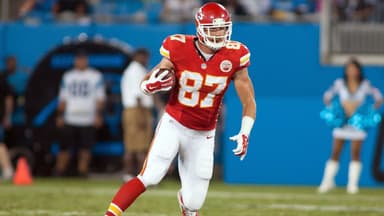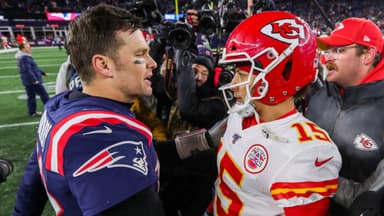There are plenty of proven examples of rookie quarterbacks benefiting from sitting behind a veteran for a season, learning the nuances of the game before taking over. Tom Brady, Aaron Rodgers, Patrick Mahomes, and Jordan Love all spent time on the sidelines early in their careers, soaking up knowledge and preparing for their eventual turn.
Advertisement
While not every veteran is eager to mentor—Brett Favre was famously indifferent toward Rodgers, and Joe Flacco showed little interest in grooming his successors—some have embraced the role. Mahomes, for instance, was fortunate to learn under Alex Smith, who served as a steady, supportive presence during his rookie year.
About a year ago, in a conversation with Nate Burleson, Patrick Mahomes opened up about his transition from college to the NFL and the adjustments he had to make to succeed at the professional level. He acknowledged that every quarterback faces a steep learning curve when moving from college football to the league, and in his case, sitting behind Alex Smith for a year was instrumental in helping him navigate that transition.
The two-time MVP explained that, as a multi-sport athlete, he had always relied on his physical gifts to make plays. That approach worked well in college, but once he reached the NFL, he quickly realized that raw athleticism alone wouldn’t cut it. Everyone at the pro level had elite physical tools.
“I think I’ve learned most in the NFL I always tell young guys coming from college, the next step you take, the more your mind’s gonna play more than your physical ability. That’s something that I truly think is when I really took that next step was that year I sat and I learned that from Alex Smith. I have always been a guy who could physically make stuff happen. But when I learned how to let my mind really work, that’s when I took that next step in my game.”
What separated Smith and what he passed on to Mahomes was the mental side of the game. Smith taught him how to read defenses, recognize coverages, anticipate traps, and use his football IQ to make plays. That mentorship unlocked a new dimension of his game, helping him evolve from a talented athlete into one of the league’s most dominant QBs.
What Patrick Mahomes came to understand is that while physical talent is essential in the NFL, it’s only one piece of the puzzle. The other, often more critical, piece is the mental side of the game. The two-time MVP has compared the NFL to a chess match, with coaches constantly scheming and trying to outsmart each other. But while a coach can only do so much from the sidelines, it’s the quarterback who must play that chess game on the field—reading defenses, anticipating moves, and adjusting on the fly.
This is one of the most important lessons for rookie quarterbacks today: arm strength and athleticism can only take you so far. To reach the next level, you have to use your mind. It’s a lesson that someone like Cam Ward needs to learn quickly. Unlike Mahomes, Brady, or Rodgers, who had the luxury of sitting and learning for a year or three, Ward might be thrust into action from day one, without the privilege of a growth phase.








